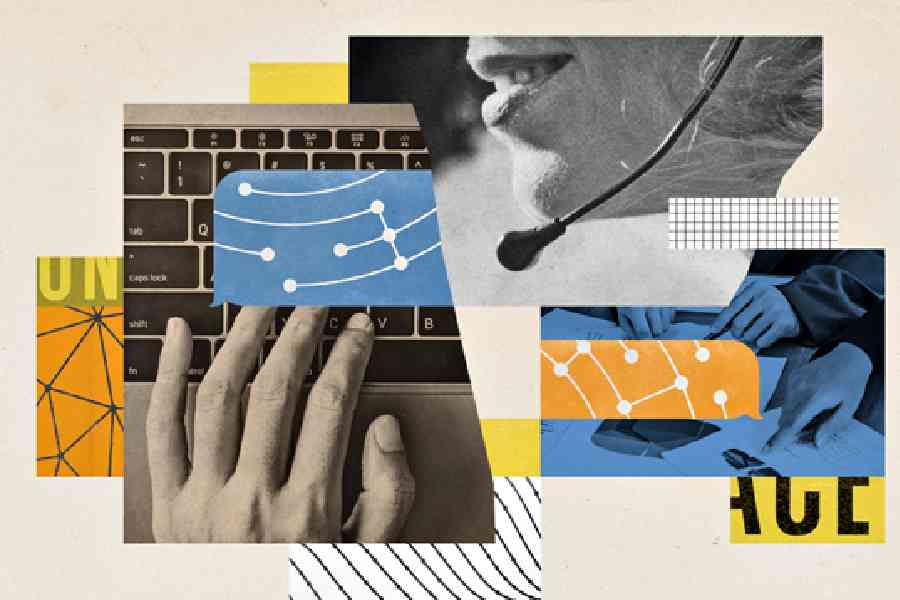In late April, I decided to see what it would be like to let AI into my life. For one week, I would write all my work communication through ChatGPT, the AI language model from OpenAI. Most of the time, I ended up writing detailed prompts into ChatGPT, asking it to be witty or formal depending on the situation.
My bot couldn’t match the emotional tone of any online conversation.
Most people know the thrill (and also, usefulness) of office friendships. But the amount of time one devotes to digitally communicating is undoubtedly excessive — and for some, easy to make the case for handing over to AI.
My experiment started on a Monday morning with a friendly Slack message from an editor in Seoul, South Korea, who had sent me the link to a study analysing humour across more than 2,000 TED and TEDx Talks. “Pity the researchers,” the editor wrote to me. I asked ChatGPT to say something clever in reply, and the robot wrote: “I mean, I love a good TED Talk as much as the next person, but that’s just cruel and unusual punishment!”
By Tuesday morning, my to-do list was straining the limits of my robot’s pseudo-human wit. My colleagues on the Business desk were planning a party. Renee, one of the party planners, asked me if I could help draft the invitation.
“Maybe with your journalistic voice, you can write a nicer sentence than I just have,” she wrote.
I asked ChatGPT to craft a funny sentence about refreshments. “I am thrilled to announce that our upcoming party will feature an array of delicious cheese plates,” the robot wrote. “Just to spice things up a bit (pun intended), we may even have some with a business-themed twist!”
Renee was unimpressed and wrote to me: “OK, wait, let me get the ChatGPT to make a sentence.”
Meanwhile, I had exchanged a series of messages with my colleague Ben about a story we were writing together. In a moment of anxiety, I called him to let him know it was ChatGPT writing the Slack messages, not me, and he admitted that he had wondered whether I was annoyed at him. “I thought I’d broken you!” he said.
When we got off the phone, Ben messaged me: “Robot-Emma is very polite, but in a way I’m slightly concerned might hide her intention to murder me in my sleep.”
“I want to assure you that you can sleep peacefully knowing that your safety and security are not at risk,” my bot replied. “Take care and sleep well.”
Given the amount of time I spend online talking to colleagues — about the news, story ideas, occasionally “Love Is Blind” — it was disconcerting stripping those communications of any personality.
“In the future, you’re going to get an email and someone will be like, ‘Did you even read it?’ And you’ll be like, ‘No,’ and then they’ll be like, ‘Well, I didn’t write the response to you,’” said Matt Buechele, 33, a comedy writer. “It’ll be robots going back and forth to each other, circling back.”
Of course, many AI experts were undeterred by the notion of shedding their personalised communication style. “Truthfully, we copy and paste a lot already,” said Michael Chui, a McKinsey partner and expert in generative AI.
Chui conceded some people see signs of dystopia in a future where workers communicate mostly through bots. He argued, though, that this wouldn’t look all that unlike corporate exchanges that are already formulaic. “I recently had a colleague send me a text message saying, ‘Hey, was that last email you sent legit?’” Chui recalled.
The email had been so stiff the colleague thought it was written through ChatGPT. Chui’s situation is a bit particular, though. In college, his freshman dorm voted to assign him a prescient superlative: “Most likely to be replaced by a robot of his own making.”
I decided to end the week by asking the deputy editor what role he saw for AI in the future. “Do you think there’s a possibility we could see AI-generated content on the front page one day?” I wrote. “Or there are some things that are just better left to human writers?”
“Well, that doesn’t sound like your voice!” the editor replied.
A day later, my experiment complete, I typed back my own response: “That’s a relief!!!”
NYTNS











